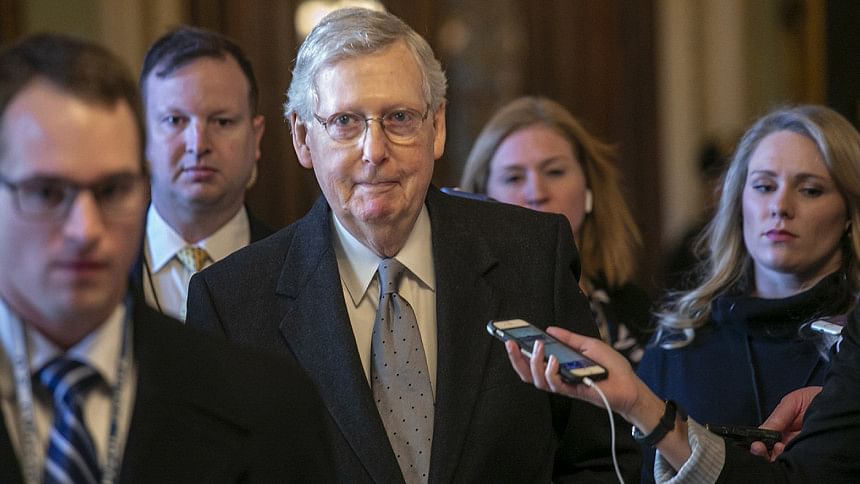US Senate to vote on ending government shutdown

The US Senate shifted slightly closer on Tuesday to resolving a month-long partial government shutdown, but there was no sign of relief anytime soon for 800,000 federal workers who are furloughed or working without pay.
Republican Senate Majority Leader Mitch McConnell laid the groundwork for a vote on Thursday on a Democratic proposal to fund the government for three weeks, without attaching the $5.7 billion in US-Mexico border wall funding demanded by President Donald Trump. The president has opposed similar legislation in the House of Representatives.
McConnell had said previously he would not consider a funding bill that Trump would refuse to sign.
The Senate leader said he would also bring up for a Thursday vote a proposal by Trump to end the shutdown that includes border wall funding and relief for "Dreamers," people brought illegally to the United States as children. The plan was unlikely to pass in the Senate and had even less chance in the Democratic-led House of Representatives.
Democrats have said they would not trade a temporary restoration of the immigrants' protections from deportation in return for a permanent border wall they view as ineffective. In 2017, Trump moved to end the Dreamers' protections, triggering a court battle.
But the Senate action could set the stage for the type of bipartisan negotiating that will be necessary to end a shutdown that began on December 22. Americans have largely blamed Trump for the shutdown, now the longest in US history.
Affected federal workers are struggling to make ends meet.
A Trump administration official said on Tuesday the president still intended to deliver his State of the Union speech on January 29, even though House Speaker Nancy Pelosi, the top US Democrat, had recommended he delay it because of the shutdown.
The request seemed likely to set up another clash between Trump and Pelosi, days after Trump abruptly refused to let her use a US military plane to go on an overseas trip hours before she was to depart.
Aides to Pelosi did not respond to requests for comment on whether Trump's invitation to speak would stand.
BARGAINING CHIP
Trump may have lost the Dreamer issue as his main negotiating point on Tuesday when the US Supreme Court was silent, at least for now, on considering an administration appeal of lower-court rulings allowing continued temporary protections for the immigrant youths.
Instead, the Deferred Action for Childhood Arrivals program established by then-President Barack Obama in 2012 lives on with or without approval by Congress.
As the Senate debates Trump's proposal, House Democrats this week are pushing legislation that would end the partial shutdown of agencies including the departments of Justice, Homeland Security, Agriculture, Commerce, Labor and Interior.
While their legislation would contain new border security money, there would be nothing for a wall, ensuring Trump's opposition.
Once the government reopens, Democrats said, they would negotiate with Trump on further border security ideas.
"We were optimistic that he might ... open up government so we could have this discussion," Pelosi told reporters in comments carried by CNN. "But then we heard what the particulars were in it and it was a non-starter, unfortunately."
Representative Jim Clyburn, the No. 3 House Democrat, welcomed any effort by the Republican-led Senate to debate and vote on legislation to reopen the government.
"This gets us started," Clyburn told MSNBC in an interview.
The shutdown's impact was being felt at the Federal Bureau of Investigation, with the FBI Agents Association saying probes of possible financial crimes, drugs and terrorism were being hindered by a lack of funds.
Many federal employees and contractors were turning to unemployment assistance, food banks and other support as the shutdown entered its second month. Others began seeking new jobs.

 For all latest news, follow The Daily Star's Google News channel.
For all latest news, follow The Daily Star's Google News channel. 



Comments